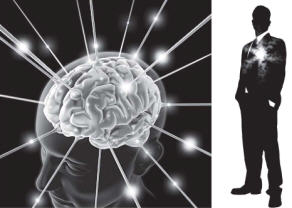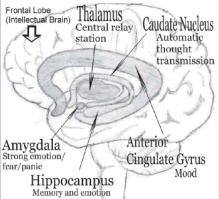For decades, scientists have failed to prove their claim that brain is the source of all emotions and therefore life. Could there be an alternative explanation?
Question: Researchers have found precise correlations between specific areas of the brain and particular emotions. Doesn’t this make the idea of soul as the source of emotions redundant?
Answer: No, because correlation doesn’t imply causality.

Here’s an example to help us understand the difference. Suppose someone write a tragedy that leads to a spate of suicides. A researcher investigating the cause of the suicides makes a detailed study of the number of times the letter “A” occurs in the book, and then proposes a thesis correlating the frequency of “A” in the book with suicides among the book’s readers. Would the correlations, even if accurately and exhaustively documented, explain the cause of the suicides? Obviously not. To claim they do would amount to a precise absurdity: an idea that is precise in its documentation but absurd in its content.
The arrangement of alphabets in a book correlates with certain higher-dimensional properties properties that arouse particular emotions (sorrow, in the case of this novel) in a conscious observer who is different from the alphabets and their arrangement and the properties. If the alphabets had not been arranged in a particular way, they would not have aroused the particular emotion of sorrows; thus the correlation is important, but is it the full explanation of the suicides? No, because even when the alphabets are appropriately arranged, they won’t arouse emotions if there is no distinct, conscious observer to experience them, as happens when nobody is reading the book.
Similarly, the correlations between particular parts of the brain and the specific emotions aroused in it may be documentable after laborious observations and experiments, but to claim that this correlation is a causal explanation amounts to a precise absurdity. Why? Because no matter how precise the documentation, it’s absurd to overlook the pre-existence of a distinct experient (person who experiences) of those emotions. Without the experient, the stimulation of the brain even if done accurately won’t arouse any emotions, as happens with a dead person even when his brain is still chemically intact. Dr. Benito Reyes explains this succinctly in his classic book, Scientific Evidence for the Existence of the Soul: “Who sits at the brain switchboard to turn it off and on, as it were? Who starts thought? Who perceives phenomena or sensations and transforms them into noumena or ideas? …[He is] the soul, the personality, the consciousness. All mental, emotional and physical life emanates from him, but it courses through the brain and the entire nervous system for expression and manifestation.”
Dr. Reyes’ words echo those of Lord Krishna in the Bhagavad-gita (13.34). Krishna explained thousands of years ago that the soul who illuminates the body with consciousness just as the sun illuminates the world with light.
Question: If our consciousness comes from the soul and not the brain, why do brain states affect consciousness? For example, why does damage to the brain’s speech center make the person unable to speak?

Answer: Consciousness originates from the soul, but manifests through the brain.
To understand this, let’s consider three crucial questions:
1. If the brain produces consciousness, then how? The brain is incredibly sophisticated in its structure, with about ten billion neurons, each of which has about ten thousand connections with other neurons. Still, all these neurons being made of non-conscious molecules are themselves non-conscious. Their interactions lead merely to the variation of their electro chemical states, which don’t produce or even refer to consciousness. The claim that matter can produce something consciousness that experiences matter is beyond not only experimental demonstration but theoretical explanation. That’s why Noble Laureate Sir John Eccles, stated, “I believe that there is a fundamental mystery in my existence, transcending any biological account of the development of my body (including my brain).”
2. If the brain produces consciousness, then how does the consciousness maintain its continuity and integrity despite the continuous death of brain cells? Each day, we lose an average of one thousand neurons in the brain. How could a speaking robot continue to speak if the hard disk containing its speech program was being continuously deleted? That’s why ISKCON scientist, Dr. Michael Cremo, eloquently states: “That consciousness and its mental contents can maintain their integrity in the face of such massive random disruptions in the brain circuitry that supposedly creates consciousness requires quite a leap of faith. It is more reasonable to suppose that the unitary consciousness of a living entity is an irreducible feature of reality and that it simply uses the brain as an instrument.”
3. Could the brain be merely transmitting and not producing consciousness? This view, postulated by the renowned psychologist William James, is illustrated by the way a prism transmits light. When a prism is damaged, the light passed through it is distorted. Similarly, when the brain is damaged, the consciousness passing through it is impeded. Let’s consider another example that of a businessperson using a computer to keep inventory. If the computer is damaged, he would be impaired in his stock-keeping. Similarly, if the brain is akin to a computer-like instrument for the consciousness, then the consciousness would be impaired in expressing itself. No wonder, another Noble Laureate, Dr Wilder Penfield, after four decades of research, concluded, “The brain is a computer . . . but it is programmed by something that is outside of itself.” That something is the soul, which the Bhagavad-gita (2.17) states “pervades the body with consciousness.”
Caitanya Carana Dasa holds a degree in electronics and telecommunications engineering and serves full-time at ISKCON Pune. To subscribe to his free cyber magazine, visit thespiritualscientist.com
